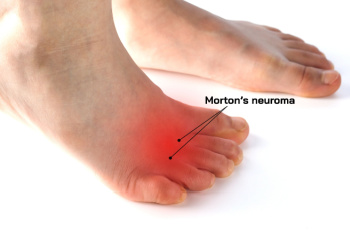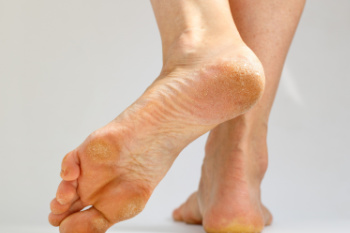Connect With Us
Blog
Items filtered by date: December 2024
How Psoriatic Arthritis Affects the Feet

Psoriatic arthritis, or PsA, is a type of arthritis that can cause pain, swelling, and stiffness in the feet, toes, and ankles. People with psoriatic arthritis often experience pain in areas where the foot's tendons or ligaments attach to the bones, particularly in the heel or the bottom of the foot. This can make walking or standing for long periods difficult. Swelling can also affect the toes, making them look sausage-like, which can make daily movements uncomfortable. In addition, changes to the toenails, such as small dents, discoloration, or nails lifting away from the skin, are common. Stiffness in the ankle or foot joints is often worse in the morning or after sitting for a while, which can impede daily activities. Over time, if PsA is not managed properly, it can cause long-term joint damage and limit mobility. A podiatrist can provide treatments to reduce pain, improve foot function, and help you to stay active. If you have foot pain caused by psoriatic arthritis, it is suggested that you schedule an appointment with a podiatrist for an exam and treatment options.
Arthritis can be a difficult condition to live with. If you are seeking treatment, contact Robert Hutchison, DPM, FACFAS from Lower Keys Foot & Ankle Surgery. Our doctor can provide the care you need to keep you pain-free and on your feet.
Arthritic Foot Care
Arthritis is a joint disorder that involves the inflammation of different joints in your body, such as those in your feet. Arthritis is often caused by a degenerative joint disease and causes mild to severe pain in all affected areas. In addition to this, swelling and stiffness in the affected joints can also be a common symptom of arthritis.
In many cases, wearing ill-fitting shoes can worsen the effects and pain of arthritis. Wearing shoes that have a lower heel and extra room can help your feet feel more comfortable. In cases of rheumatoid arthritis, the arch in your foot may become problematic. Buying shoes with proper arch support that contour to your feet can help immensely.
Alleviating Arthritic Pain
- Exercises that stretch the foot can prevent further pain and injury and increase mobility
- Most of the pain can be alleviated with anti-inflammatory drugs, heat, and topical medications
- Massages can help temporarily alleviate pain.
It is best to see your doctor for the treatment that is right for your needs and symptoms. Conditions vary, and a podiatrist can help you determine the right method of care for your feet.
If you have any questions, please feel free to contact our office located in Key West, FL . We offer the newest diagnostic tools and technology to treat your foot and ankle needs.
Symptoms and Treatment of Morton’s Neuroma

Morton’s neuroma is a condition that involves the thickening or enlargement of a nerve in the foot, often occurring between the third and fourth toes. Morton’s neuroma can cause sharp, stabbing, or throbbing pain in the ball of the foot, along with numbness, tingling, and a burning sensation. Many patients report feeling as if they are stepping on a pebble. Poorly fitting shoes, high heels, or foot structures like high arches or overpronation may contribute to the development of Morton’s neuroma. A podiatrist can diagnose Morton’s neuroma by evaluating symptoms and conducting a physical exam, often using specific tests to pinpoint the affected nerve. Treatment may involve wearing properly fitting shoes, using metatarsal pads, or being fitted for custom orthotics to alleviate pressure on the nerve. In cases where conservative measures do not provide relief, a podiatrist may recommend corticosteroid injections or surgery. If you have nerve pain in the ball of the foot, it is suggested that you schedule an appointment with a podiatrist for an exam and treatment options.
Morton’s neuroma is a very uncomfortable condition to live with. If you think you have Morton’s neuroma, contact Robert Hutchison, DPM, FACFAS of Lower Keys Foot & Ankle Surgery. Our doctor will attend to all of your foot care needs and answer any of your related questions.
Morton’s Neuroma
Morton's neuroma is a painful foot condition that commonly affects the areas between the second and third or third and fourth toe, although other areas of the foot are also susceptible. Morton’s neuroma is caused by an inflamed nerve in the foot that is being squeezed and aggravated by surrounding bones.
What Increases the Chances of Having Morton’s Neuroma?
- Ill-fitting high heels or shoes that add pressure to the toe or foot
- Jogging, running or any sport that involves constant impact to the foot
- Flat feet, bunions, and any other foot deformities
Morton’s neuroma is a very treatable condition. Orthotics and shoe inserts can often be used to alleviate the pain on the forefront of the feet. In more severe cases, corticosteroids can also be prescribed. In order to figure out the best treatment for your neuroma, it’s recommended to seek the care of a podiatrist who can diagnose your condition and provide different treatment options.
If you have any questions, please feel free to contact our office located in Key West, FL . We offer the newest diagnostic and treatment technologies for all your foot care needs.
Chronic Plantar Fasciitis

Plantar fasciitis is a common condition caused by inflammation of the plantar fascia, a thick band of tissue connecting the heel to the toes. It typically results in sharp heel pain, especially during the first steps in the morning or after prolonged periods of rest. This condition is often linked to overuse, improper footwear, obesity, or high-impact activities like running. While many cases improve with conservative treatments, plantar fasciitis can become chronic if untreated or mismanaged. Chronic plantar fasciitis occurs when the inflammation persists for several months, leading to degenerative changes in the fascia, ongoing pain, and limited mobility. Treatment for chronic cases may include custom orthotics, targeted exercises, or advanced options like shockwave therapy, injections, or even surgery. If you have ongoing pain from plantar fasciitis, it is suggested that you see a podiatrist who can provide expert care.
Plantar fasciitis is a common foot condition that is often caused by a strain injury. If you are experiencing heel pain or symptoms of plantar fasciitis, contact Robert Hutchison, DPM, FACFAS from Lower Keys Foot & Ankle Surgery. Our doctor can provide the care you need to keep you pain-free and on your feet.
What Is Plantar Fasciitis?
Plantar fasciitis is one of the most common causes of heel pain. The plantar fascia is a ligament that connects your heel to the front of your foot. When this ligament becomes inflamed, plantar fasciitis is the result. If you have plantar fasciitis you will have a stabbing pain that usually occurs with your first steps in the morning. As the day progresses and you walk around more, this pain will start to disappear, but it will return after long periods of standing or sitting.
What Causes Plantar Fasciitis?
- Excessive running
- Having high arches in your feet
- Other foot issues such as flat feet
- Pregnancy (due to the sudden weight gain)
- Being on your feet very often
There are some risk factors that may make you more likely to develop plantar fasciitis compared to others. The condition most commonly affects adults between the ages of 40 and 60. It also tends to affect people who are obese because the extra pounds result in extra stress being placed on the plantar fascia.
Prevention
- Take good care of your feet – Wear shoes that have good arch support and heel cushioning.
- Maintain a healthy weight
- If you are a runner, alternate running with other sports that won’t cause heel pain
There are a variety of treatment options available for plantar fasciitis along with the pain that accompanies it. Additionally, physical therapy is a very important component in the treatment process. It is important that you meet with your podiatrist to determine which treatment option is best for you.
If you have any questions, please feel free to contact our office located in Key West, FL . We offer the newest diagnostic and treatment technologies for all your foot care needs.
Let the Expert Treat Your Ingrown Toenails
My Ankle Hurts

Ankle pain while walking can significantly impact your daily activities, and several conditions may be the culprit. Fractures, often resulting from trauma like a fall, typically cause severe pain, swelling, bruising, and an inability to bear weight on the foot. Treatment may include immobilization or surgery, depending on the severity of the fracture. Tendon sprains or tears, often caused by overuse or sudden movements, lead to pain, swelling, and difficulty moving the ankle. A podiatrist may recommend compression or targeted exercises to help with healing. Ligament sprains or tears occur when the ankle twists or rolls, causing pain, bruising, and swelling. Treatment typically involves rest and elevation. Dislocations, where the bones in the ankle are out of place, can cause severe pain, swelling, and visible deformity. Immediate treatment involves realigning the joint, followed by rehabilitation. If you are experiencing ankle pain, it is suggested that you consult a podiatrist for a proper diagnosis and treatment plan.
Ankle pain can be caused by a number of problems and may be potentially serious. If you have ankle pain, consult with Robert Hutchison, DPM, FACFAS from Lower Keys Foot & Ankle Surgery. Our doctor will assess your condition and provide you with quality foot and ankle treatment.
Ankle pain is any condition that causes pain in the ankle. Due to the fact that the ankle consists of tendons, muscles, bones, and ligaments, ankle pain can come from a number of different conditions.
Causes
The most common causes of ankle pain include:
- Types of arthritis (rheumatoid, osteoarthritis, and gout)
- Ankle sprains
- Broken ankles
- Achilles tendonitis
- Achilles tendon rupture
- Stress fractures
- Bursitis
- Tarsal tunnel syndrome
- Plantar fasciitis
Symptoms
Symptoms of ankle injury vary based upon the condition. Pain may include general pain and discomfort, swelling, aching, redness, bruising, burning or stabbing sensations, and/or loss of sensation.
Diagnosis
Due to the wide variety of potential causes of ankle pain, podiatrists will utilize a number of different methods to properly diagnose ankle pain. This can include asking for personal and family medical histories and of any recent injuries. Further diagnosis may include sensation tests, a physical examination, and potentially x-rays or other imaging tests.
Treatment
Just as the range of causes varies widely, so do treatments. Some more common treatments are rest, ice packs, keeping pressure off the foot, orthotics and braces, medication for inflammation and pain, and surgery.
If you have any questions, please feel free to contact our office located in Key West, FL . We offer the newest diagnostic and treatment technologies for all your foot care needs.
Pain in the Bottom of the Foot

Pain in the bottom of the foot can be caused by several conditions, including plantar fasciitis, plantar warts, or Morton’s neuroma. Each has distinct causes and symptoms. Plantar fasciitis is the most common cause, resulting from inflammation of the plantar fascia, a band of tissue along the sole of the foot. It typically causes sharp pain in the heel, especially with the first steps in the morning or after long periods of rest. It is often due to overuse, tight calf muscles, or wearing improper footwear. Plantar warts are growths caused by the human papillomavirus, or HPV, appearing as small, rough bumps on the sole of the foot. They can cause pain when walking or standing, particularly if they are in weight-bearing areas, and are extremely contagious. Morton’s neuroma is a thickening of tissue surrounding a nerve in the ball of the foot, often between the third and fourth toes. Symptoms include burning, numbness, or sharp pain in the ball of the foot. A podiatrist can accurately diagnose these conditions and recommend treatments, including custom orthotics, targeted exercises, or in some cases, surgery. If you are experiencing persistent foot pain, it is suggested that you schedule an appointment with a podiatrist for expert care and relief.
Foot Pain
Foot pain can be extremely painful and debilitating. If you have a foot pain, consult with Robert Hutchison, DPM, FACFAS from Lower Keys Foot & Ankle Surgery. Our doctor will assess your condition and provide you with quality foot and ankle treatment.
Causes
Foot pain is a very broad condition that could be caused by one or more ailments. The most common include:
- Bunions
- Hammertoes
- Plantar Fasciitis
- Bone Spurs
- Corns
- Tarsal Tunnel Syndrome
- Ingrown Toenails
- Arthritis (such as Gout, Rheumatoid, and Osteoarthritis)
- Flat Feet
- Injury (from stress fractures, broken toe, foot, ankle, Achilles tendon ruptures, and sprains)
- And more
Diagnosis
To figure out the cause of foot pain, podiatrists utilize several different methods. This can range from simple visual inspections and sensation tests to X-rays and MRI scans. Prior medical history, family medical history, and any recent physical traumatic events will all be taken into consideration for a proper diagnosis.
Treatment
Treatment depends upon the cause of the foot pain. Whether it is resting, staying off the foot, or having surgery; podiatrists have a number of treatment options available for foot pain.
If you have any questions, please feel free to contact our office located in Key West, FL . We offer the newest diagnostic and treatment technologies for all your foot care needs.

